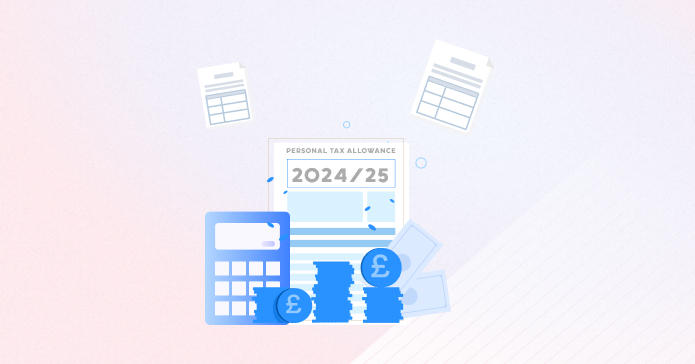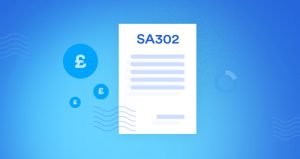Navigating the UK tax system can be daunting, but understanding the personal tax allowance for 2024/25 can help you make the most of your hard-earned money. Whether you're a taxpayer, small business owner, or financial advisor, this guide will walk you through everything you need to know about personal tax allowance, income tax rates, and marriage allowance for the upcoming tax year.
What is Personal Allowance
To kick things off, let's answer a fundamental question: what is personal allowance?
Simply put, personal allowance is the amount of income you can earn each year without paying any income tax. For the 2024/25 tax year, the personal allowance is £12,570.
Knowing your personal allowance helps you plan your finances effectively. It ensures you're not overpaying taxes and can allocate your resources more efficiently.
What is Income Tax?
There are three distinct tax levels applied to earned income: a basic rate, a higher rate, and an additional rate. In the fiscal year of 2024/25, the rates of these three categories stand at 20%, 40%, and 45% respectively.
- The basic 20% is applied to 'taxable income,' up to a limit set at £37,700. It's important to note that this does not include any personal allowances - sums of money that one can earn without being subject to taxation.
- The higher 40% tax rate comes into play for taxable income that falls between the basic rate limit and the supplemental rate threshold, which is set at £125,140.
- Lastly, any taxable income exceeding £125,140 is taxed at the additional rate of 45%.
The rates and thresholds for all three taxation levels remain consistent with the preceding financial year of 2023/24.
Income Tax Rates for 2024/25
Understanding the income tax rates for 2024/25 will help you anticipate your tax liabilities. The UK has a progressive tax system, meaning the more you earn, the higher your tax rate will be. Here's a breakdown of the income tax rates for the upcoming tax year:
Personal Allowance
For the 2024/25 tax year, the personal allowance is up to £12,570. This means you won't pay any income tax on earnings up to this amount. It's a significant relief, especially for low-income earners who are looking to maximize their take-home pay.
Basic Rate
Earnings between £12,571 and £50,270 fall under the basic rate, taxed at 20%. This rate applies to a large portion of taxpayers and is crucial for budgeting your finances for the year. Small business owners should pay special attention to this bracket to manage their payroll efficiently.
Higher Rate
Income between £50,271 and £125,140 is subject to a 40% tax rate. If you fall into this bracket, it’s essential to explore tax-saving strategies to reduce your liabilities. Financial advisors can offer invaluable advice to clients within this income range, guiding them on deductions and allowances.
Additional Rate
For those earning over £125,140, the tax rate is 45%. This rate applies to high-income individuals and requires careful planning to minimize tax impact. Understanding this bracket can help you prepare better and make informed decisions about investments and savings.
Marriage Allowance for 2024/25
Eligible married pairs and those in civil partnerships have the opportunity to apply for the marriage allowance. If an individual's income doesn't reach the limit that fully utilizes their personal allowance, they have the option to shift this underused portion to their significant other or civil partner, limited to a specific quantity.
This benefit cannot be availed if the spouse or partner is a taxpayer beyond the basic tax threshold.
For the fiscal year of 2024/25, the highest transferable amount is capped at £1,260.
National Insurance & Income Tax
The difference between national insurance and income tax is often a point of confusion for taxpayers. While both are types of taxes, they serve different purposes.
National insurance is primarily used to fund state benefits such as the State Pension and Jobseeker's Allowance. In contrast, income tax goes towards general government expenditure.
Unlike income tax, national insurance has its own set of thresholds and rates. The rates for 2024/25 remain unchanged from the preceding financial year.
- Employees earning between £12,570 and £50,270 pay national insurance at a rate of 12%
- For earnings above £50,271, the rate drops to 2%
- Self-employed individuals contribute at a flat rate of 9% on profits over £9,568
Understanding the differences between national insurance and income tax can help you plan your finances efficiently and avoid any unexpected tax liabilities.
Tax Bands and Rates Breakdown
Here’s a quick reference for the tax bands and rates for the 2024/25 tax year:
- Personal Allowance: Up to £12,570, taxed at 0%
- Basic Rate: £12,571 to £50,270, taxed at 20%
- Higher Rate: £50,271 to £125,140, taxed at 40%
- Additional Rate: Over £125,140, taxed at 45%
Conclusion
In conclusion, understanding the personal allowance and income tax rates for 2024/25 can help you make informed financial decisions. Whether you're a taxpayer, small business owner, or financial advisor, being aware of these figures will aid in efficient budgeting and tax planning. Additionally, knowing about marriage allowance and the differences between national insurance and income tax can further benefit your financial management. Stay updated with any changes in tax laws to ensure you are maximizing your personal allowance and minimizing your tax liabilities. With this knowledge, you can confidently navigate the UK tax system and make the most out of your hard-earned money. So remember to keep these key points in mind for a successful 2024/25 tax year. Happy budgeting!
Additional Tips for Efficient Tax Planning
- Keep track of your income and expenses throughout the year to accurately estimate your tax liabilities.
- Utilize all available deductions and allowances to minimize your taxable income.
- Consider investing in tax-efficient schemes, such as ISAs, pensions, and charitable donations.
- Seek professional help from a financial advisor or accountant to ensure you are making the most out of your finances.
- Stay updated with any changes in tax laws that may affect your tax planning strategies.
- Plan ahead for any potential changes in personal circumstances that may impact your tax liabilities.
By implementing these tips, you can effectively manage your taxes and potentially save money in the long run. Don't underestimate the importance of tax planning and stay informed to make the most out of your financial situation. So here's to a successful and financially savvy 2024/25 tax year!













